Select Language

By Jihoon Lee
SEOUL (Reuters) -South Korea's market watchdog chief warned that companies could face penalties for failing to boost shareholder returns in the long run, signalling a tougher approach after a reform package to spur voluntary efforts was met with market disappointment.
"Authorities are discussing various measures to deal with firms failing to meet certain criteria regarding shareholder returns," Lee Bok-hyun, governor of the Financial Supervisory Service, told a press conference on Wednesday.
The steps under consideration were not included in the corporate reform package announced on Monday but Lee said they will be incorporated once authorities have finalised details.
Possible penalties include removing non-compliant firms from the stock market, Lee said, adding that it would be problematic for firms to remain listed while making no progress over a prolonged period.
The reform plan for listed companies announced on Monday, dubbed "Corporate Value-up Programme", aims to boost shareholder returns in an effort to reduce the "Korea discount" on stock prices.
The Korea discount refers to a tendency for South Korean companies to have lower valuations than global peers due to factors such as low dividend payouts, and the dominance of opaque conglomerates known as chaebols.
But many analysts said the reform package didn't go far enough, noting the lack of details and the absence of any penalties or tax benefits that would push companies to make changes.
"The FSS governor's comments raise hope that there will be follow-up measures that are compulsory," said Park So-yeon, an analyst at Shinyoung Securities.
"There is considerable concern that it might be a policy just prepared for the legislative election in April, but if it does get carried out under a mid- to long-term roadmap, it will be something we can look forward to," Park said.
In separate comments on Wednesday, after meeting with representatives from foreign investment banks to hear their views about the policy initiative, vice finance minister Kim Byoung-hwan said the programme "will not end up as a one-time, short-term task but is part of continuous, mid- to long-term efforts".
The benchmark KOSPI index rose more than 1% on Wednesday, after falling for two straight days. Shares of automakers and banks, considered undervalued, led the gains.
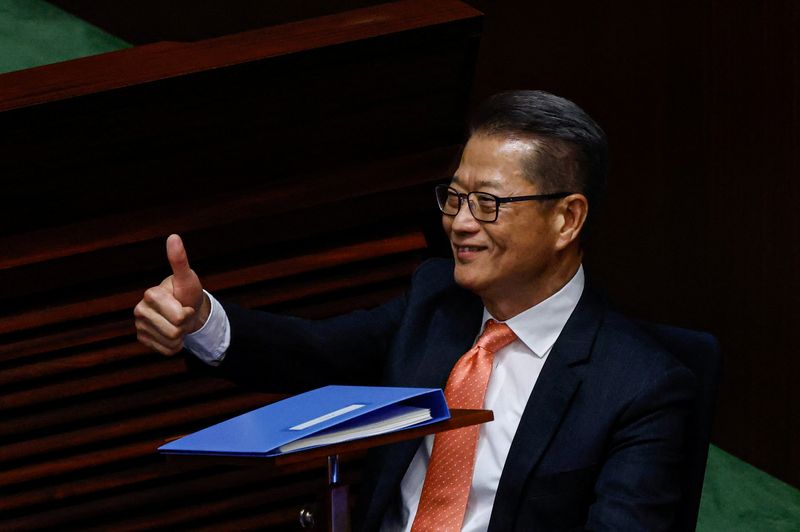
By Clare Jim and James Pomfret
HONG KONG (Reuters) -Hong Kong's financial secretary on Wednesday announced major measures to bolster the city's flagging property market by scrapping most stamp duties on transactions, with the city economy expected to grow a modest 2.5%-3.5% this year.
The financial hub that expanded 3.2% in 2023, will cancel all buy-side property tightening measures for residential properties and waive stamp duties payable on the transfer of REIT units, Paul Chan told lawmakers in his annual budget.
Noting challenges including high interest rates, a complex geopolitical environment as well as ballooning recent budget deficits, Chan announced a mix of measures spanning property, tourism and financial services to lure back capital, businesses and visitors to the city, as well as restore fiscal balance.
On property, long a key pillar of the economy, Chan said all demand-side management measures for residential properties would be scrapped with immediate effect.
"We consider that the relevant measures are no longer necessary amidst the current economic and market conditions," Chan said, adding that there was room to further tweak measures for the real estate sector.
These include cutting all additional stamp duties for foreign buyers and those for the purchase of second properties, that had been imposed in the decade prior to the current slump to try to cool one of the world's priciest property markets.
Hong Kong's housing prices have plunged 20% since their 2021 peak given both economic and political headwinds, including a national security clampdown that stoked an emigration wave from the city and a slowing Chinese economy impacting potential Chinese home buyers - long a driver of the market.
Hong Kong's stock market property sub-index was up just over 2% on the news, before paring back some gains.
"It is believed that in the short term, it will stimulate the trading volume, promote the recovery of the property market, restore market confidence, and stabilize property prices," said Wang Zhaoqi, the head of research for property firm Knight Frank.
The government will roll out more than HK$1 billion ($127 million) in support measures for its beleaguered tourism industry, to help offset the impact from the struggling Chinese economy, which has resulted in fewer visitors from the mainland.
The city will stage more than 80 "mega events" in the first half of the year to boost tourism, including a monthly fireworks and drone show at its famed Victoria Harbour.
On Hong Kong's ballooning fiscal deficits, with the city running up deficits for four of the past five years, Chan pledged to "adopt a fiscal consolidation strategy to narrow our fiscal deficit progressively towards achieving the goal of restoring fiscal balance," though he didn't specify a timeframe.
In fiscal 2022/23 Hong Kong posted a budget deficit of HK$122.3 billion ($15.63 billion) after taking into account the proceeds of HK$66 billion received from issuance of green bonds.
Economic growth has also been hampered by geopolitical tensions between China and the United States, while capital flight turned the Hong Kong stock market into the worst performing major index last year.
($1 = 7.8260 Hong Kong dollars)

By Timothy Gardner
WASHINGTON (Reuters) -The U.S. environment regulator said on Tuesday it is launching new cleanup projects at 25 hazardous waste sites from New Jersey to Oregon with $1 billion in funds.
The sites are in the Environmental Protection Agency's Superfund program, originally created in 1980, which helps to repurpose land polluted by heavy industry for new economic development, including parks and warehouses.
The $1 billion is the third and final wave of $3.5 billion in funding appropriated by the bipartisan infrastructure bill U.S. President Joe Biden signed into law in 2021.
"This funding will help improve people's lives especially those who have long been on the front lines of pollution," Janet McCabe, the deputy EPA administrator told reporters on a call.
McCabe said 75% of the 25 sites are in historically underserved communities. The $1 billion also will help speed up ongoing work at 85 Superfund sites. More than 25% of Black and Hispanic Americans live within three miles (5 km) of a Superfund site, McCabe said.
New Jersey, which has more Superfund sites than any other state, has three sites among the 25 including Raritan Bay Slag in Old Bridge and Sayreville, where a seawall and jetty were built using slag, waste from the bottom of industrial blast furnaces used to smelt metal from the 1960s to the 1970s.
U.S. Representative Frank Pallone of New Jersey said the funding will work well with an expected infusion of $23 billion over five years for Superfund after "polluters pay" taxes for the program were reinstated in the infrastructure law and Biden's Inflation Reduction Act.
"Reinstating that Superfund tax is really only about basic fairness that corporate polluters, not taxpayers, should have to pay to clean up the messes that they created," Pallone told reporters.
In Clackamas, Oregon, the funding will help clean up the Northwest Pipe & Casing/Hall Process Company site where pipes were made and coated from the 1950s to the 1980s contaminating soil and groundwater with solvents, primers, coal tar and other pollutants, the EPA said.

SYDNEY (Reuters) - Australian consumer price inflation held at a two-year low in January, dashing forecasts for a tick higher and reinforcing market expectations interest rates would not need to increase any further.
There has been limited market reaction as the January release is heavily weighted toward goods prices that have been falling faster than services, and thus suggest some scope for a downside surprise.
Data from the Australian Bureau of Statistics on Wednesday showed its monthly consumer price index (CPI) rose at an annual pace of 3.4% in January, unchanged from December and under market forecasts of 3.6%.
A closely watched measure of core inflation, the trimmed mean, rose an annual 3.8%, down from 4.0% in December. Inflation excluding volatile items and holiday travel slowed to 4.1% from 4.2%.
For January alone, CPI fell 0.3% from the previous month, driven by declines in holiday travel, clothes and garments and petrol. Holiday travel slumped 5.2% from a month earlier.
The Reserve Bank of Australia has raised interest rates by 425 basis points since May 2022 to a 12-year top of 4.35%, and has not ruled out the risk of another hike if necessary to bring inflation back to the bank's target band of 2-3%.
Financial markets are confident the RBA is done tightening. Swaps imply about a 60% chance of a first rate cut in August and a total easing of 38 basis points by the end of the year, little changed from before.
The Australian dollar was little changed at $0.6547, and three year bond futures held at 96.26.
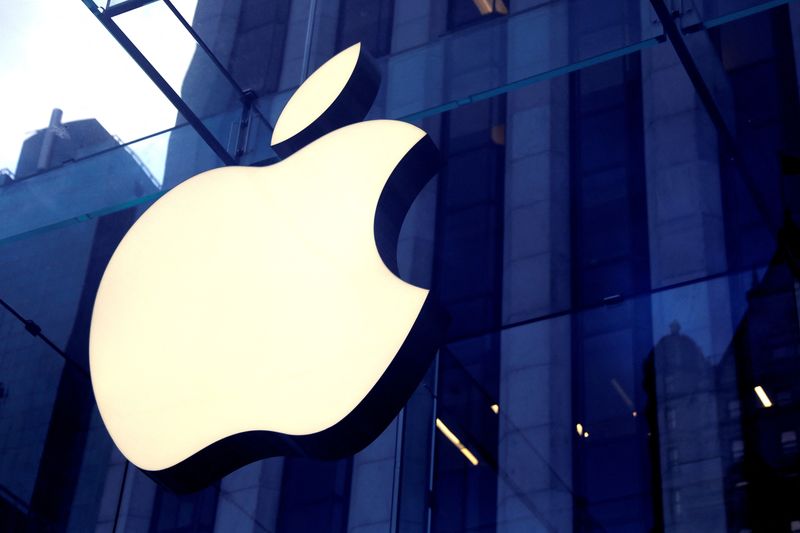
By Stephen Nellis and Shivansh Tiwary
(Reuters) -Apple has canceled work on its electric car, a source familiar with the matter told Reuters on Tuesday, a decade after the iPhone maker kicked off the project.
Shares of the company were up 0.7% in afternoon trading, having pared some losses from earlier in the trading day.
Several employees working on the electric car project will be shifted to the firm's artificial intelligence (AI) division, according to Bloomberg News, which first reported the development.
Apple (NASDAQ:AAPL) declined to comment.
High interest rates to tame inflation have soured consumer sentiment and led to a slowdown in demand for usually pricier electric vehicles, prompting the industry to cut jobs and reduce production.
Several major automakers, including EV market leader Tesla (NASDAQ:TSLA), have decided to pull back on investments, with some shifting plans to focus on hybrids instead of fully battery-powered cars.
Apple kicked off Project Titan, as its car effort was known internally, a decade ago, as a wave of interest in self-driving vehicles swept through Silicon Valley.
Reuters reported in 2020 that Apple was considering releasing a vehicle as soon as 2024 or 2025.
But progress had been uneven even before the COVID-19 pandemic disrupted the global automotive industry.
Apple had laid off 190 workers from the group in 2019 after revamping its software approach.
The design of the concept vehicle also changed, from a radical, steering-wheel-free autonomous vehicle that would have been a departure from traditional automotive design, to a more conventional car with advanced driver-assistance features.
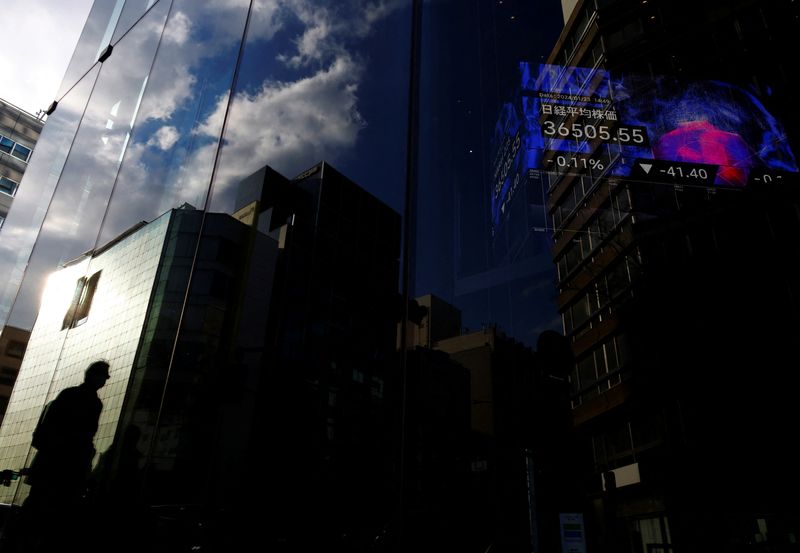
By Tom Westbrook
SINGAPORE (Reuters) -Asian shares slipped on Tuesday, with slightly warmer-than-expected Japanese inflation putting investors on guard ahead of price data due in Europe and the U.S. this week, though bitcoin extended gains on signs that institutional buyers are circling.
The yen steadied at 150.50 to the dollar and inched off a three-month low on the euro as Japanese inflation stayed at the central bank's 2% year-on-year target, keeping alive expectations it would exit negative rates by April.
Tokyo's Nikkei eked a fresh record high, but closed just 0.01% firmer. MSCI's broadest index of Asia-Pacific shares outside Japan dipped 0.2%, keeping below last week's seven-month peak. (T)
Brent crude futures hovered around $82.63 a barrel after Reuters reported Hamas received a draft Gaza truce proposal including a 40-day pause in fighting.
S&P 500 nudged 0.1% lower while Nasdaq futures, FTSE futures and European futures each fell about 0.2%.
The Federal Reserve's favoured measure of inflation - the core personal consumption expenditures (PCE) price index - is due on Thursday and forecasts are for a rise of 0.4%.
"If as expected, the core m/m reading would be the highest since last February and fit with the patience message from the Fed," said analysts at ANZ Bank.
Rate jitters and enormous auctions - $127 billion on Tuesday and another $42 billion on Wednesday - left Treasuries under pressure, though yields steadied in the Asia day. [US/]
Ten-year U.S. Treasury yields were last 1.4 basis points lower at 4.29%. Two-year yields fell 3 bps to 4.71%.
Markets have already pushed out the likely timing of a first Federal Reserve easing from May to June, which is currently priced at around a 70% probability. Futures imply a little more than three quarter-point cuts this year, compared to five at the start of the month.
RBNZ RETREAT
Currency trade was fairly subdued Asia, with recent pressure on the Australian and New Zealand dollars extending. The Aussie touched a one-week low of $0.6525, squeezed by a tumble in iron ore prices, before a slight recovery to $0.6547. [AUD/]
The kiwi was also at a week-low as traders trimmed wagers that New Zealand's central bank might even hike interest rates when it meets on Wednesday.
"With 9 bp priced, we see modest NZD weakness on the announcement," said NatWest Markets currency strategist Antony George.
The euro held steady at $1.0850 and sterling inched down to $1.2676 with speculators trimming bullish bets. Bitcoin rose more than 3% to top $57,000.
Figures on inflation in the European Union are also due this week, on Friday, with the core gauge again seen slowing to the lowest since early 2022 at 2.9% and bringing nearer the day when the European Central Bank (ECB) might ease policy.
Markets are almost fully priced for a first cut in June, with April seen as a 36% chance. In speeches on Monday, ECB President Christine Lagarde and Bank of Greece Governor Yannis Stournaras again pointed to a reticence to rush into cuts
Bank of England deputy Dave Ramsden and Riksbank Governor Erik Thedeen appear later on Tuesday while a smattering of mostly second-tier U.S. and European data are due including consumer confidence for Germany, France and the U.S.
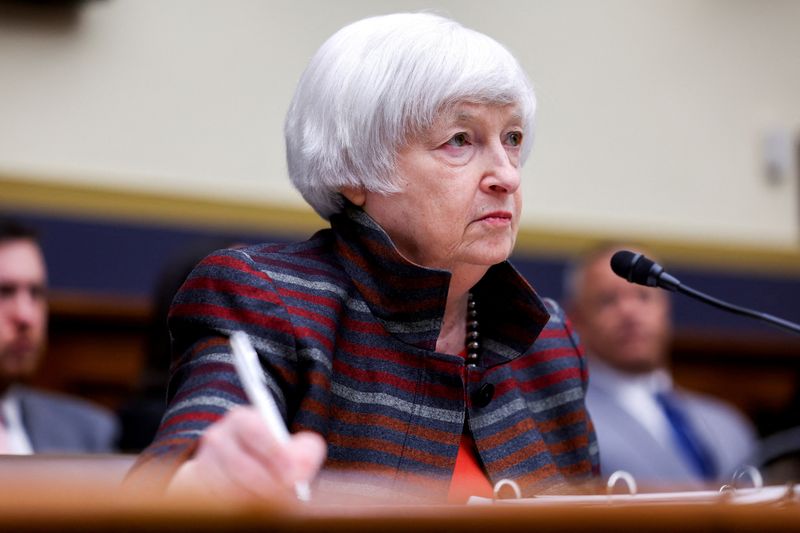
By Andrea Shalal
SAO PAULO (Reuters) - Strong U.S. economic growth has been a "key driver" of better than expected global growth, U.S. Treasury Secretary Janet Yellen will tell a news conference on Tuesday ahead of this week's meeting of G20 finance officials in Sao Paulo, Brazil.
In excerpts of her remarks released by Treasury, Yellen said the International Monetary Fund and other forecasters had projected a broad-based slowdown in the global economy in 2023 that did not happen.
Instead, growth came in at 3.1%, exceeding expectations, and inflation fell, with prices expected to continue falling this year in about 80% of economies, she said.
"Going forward, we remain cognizant of the risks facing the global outlook and continue to carefully monitor the economic challenges in certain countries, but the global economy remains resilient," she said.
Yellen said U.S. economic strength had underpinned global growth, fueled by Biden administration policies supporting businesses hit hard by the COVID-19 pandemic and investments in domestic manufacturing, clean energy and infrastructure.
U.S. inflation had also declined significantly from its peak and the U.S. labor market was historically strong, she said, with the prime-age labor force above its pre-pandemic level and the unemployment rate near historic lows.
"Had a U.S. recession come in 2023, like many predicted, global growth would have been thrown off track. While there are risks to our outlook, America’s growth has consistently exceeded projections," Yellen said.
The IMF last month edged its global growth outlook to 3.1% in 2024, up two-tenths of a percentage point from its October forecast, and left its 2025 forecast unchanged at 3.2%.
The IMF's chief economist, Pierre-Olivier Gourinchas, said the global lender's updated World Economic Outlook showed a "soft landing" was in sight, but overall growth and global trade remained lower than the historical average.
Yellen said growth in many economies, including Brazil, the current president of the Group of 20 economies, had also contributed to global growth, although other economies still faced challenges. She did not specify which countries were facing problems.
IMF spokesperson Julie Kozack last week told reporters the global lender would take new information on the Japanese and British economies, which both slipped into recession, into account as it prepared a new global forecast to be released in April.
(This story has been corrected to fix the spelling of Sao Paulo in the dateline and paragraph 1)
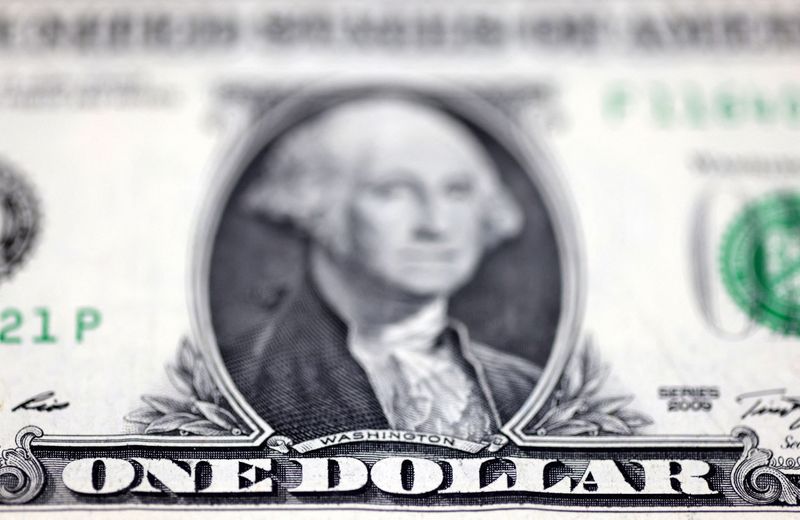
By Kevin Buckland
TOKYO (Reuters) -The dollar traded on the back foot on Tuesday, as markets looked ahead to a week of U.S. economic data that will provide fresh signals on how soon the Federal Reserve may begin cutting interest rates.
Leading cryptocurrency bitcoin soared to a more than two-year high above $57,000 after enterprise software firm MicroStrategy Inc announced it had bought about 3,000 more of the tokens for $155 million.
The U.S. dollar index, which measures the currency against a basket of peers including the euro and yen, traded flat at 103.77 in Asian time, following a 0.17% slide on Monday.
Markets have all but ruled out a cut at the Fed's March meeting and have recently pushed back expectations for a cut to June from May, CME's FedWatch Tool showed, following strong U.S. consumer and producer price data.
U.S. durable goods data is due later on Tuesday, while January's U.S. personal consumption expenditures price index, which is the Fed's preferred measure of inflation, will be released on Thursday.
"A still softish DXY (dollar index) doesn't quite convey the USD's story right here ... and, if anything, key upcoming event risk can potentially fuel another leg up," Westpac's head of FX strategy, Richard Franulovich, wrote in a note.
"The bulk of DXY's gains this year have unfolded over just a handful of marquee sessions, and outside that it has been decidedly consolidative," he said. "The lacklustre DXY in recent days looks mostly like a continuation of that profile."
The dollar slipped 0.13% to 150.485 yen, as Japan's currency firmed following the release of figures showing consumer inflation stayed at the Bank of Japan's 2% target, rather than dipping below it for the first time in nearly two years, as economists had forecast.
The euro was unchanged at $1.08505, following a 0.27% advance in the previous session.
Bitcoin was last 3.3% higher at $56,338, after earlier jumping to $57,055 for the first time since December of 2021.
Risk-sensitive antipodean currencies sank amid a slide in regional equities, continuing a retreat from multi-week peaks.
The Australian dollar lost 0.2% to $0.6528, after reaching a three-week high of $0.6595 on Thursday.
The kiwi eased 0.3% to $0.61555, after touching the highest since Jan. 15 at $0.6218 on Thursday.
Traders are gearing up for what could turn out to be a significant policy meeting by the Reserve Bank of New Zealand (RBNZ) on Wednesday. Markets are pricing in a one-in-three chance the RBNZ will raise its 5.5% official cash rate to combat stubborn inflation.
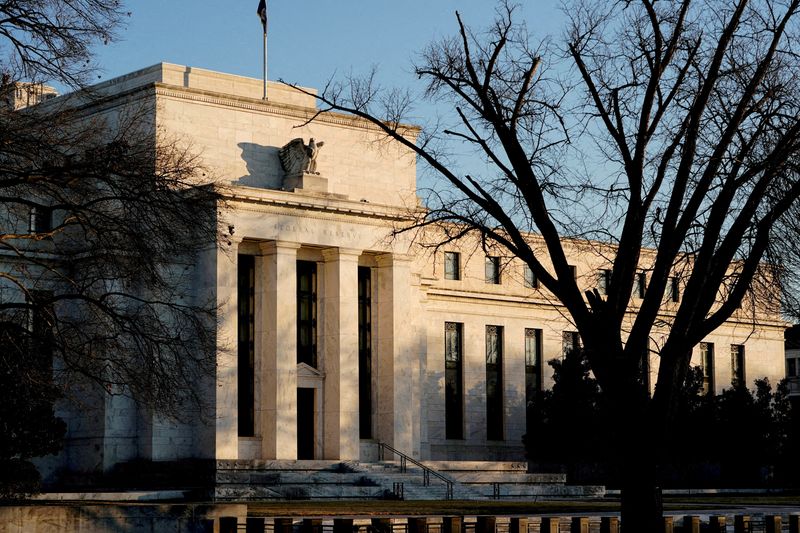
(Reuters) - Kansas City Federal Reserve Bank President Jeffrey Schmid on Monday used a debut speech on policy to signal that he, like most of his central banking colleagues, is in no rush to cut interest rates.
"With inflation running above target, labor markets tight and demand showing considerable momentum, my own view is that there is no need to preemptively adjust the stance of policy," Schmid said in his first extensive public remarks since he began the job last August. "Instead, I believe that the best course of action is to be patient, continue to watch how the economy responds to the policy tightening that has occurred, and wait for convincing evidence that the inflation fight has been won."
Schmid's cautious approach suggests a hawkish outlook in sync with recent Kansas City Fed presidents.
But it is also one that resonates with the message of other Fed policymakers in recent weeks signaling they want to keep the policy rate in its current 5.25%-5.5% range until they have greater confidence that inflation is headed to the Fed's 2% goal.
Shipping disruptions in the Red Sea could put renewed upward pressure on goods prices, Schmid said, and hotter-than-expected consumer price inflation in January, especially for services, argues for "caution" on expectations for further disinflation.
Schmid also signaled hawkishness with regards to the Fed's balance sheet. While he said he is in "no hurry" to halt the ongoing reduction in the size of the balance sheet, Schmid said he does not favor an "overly cautious approach."
Some Fed policymakers have argued that the time may soon come to slow those reductions to give time for the Fed to assess how far it can shrink its portfolio without roiling markets.
"Some interest-rate volatility should be tolerated as we continue to shrink our balance sheet," he said.
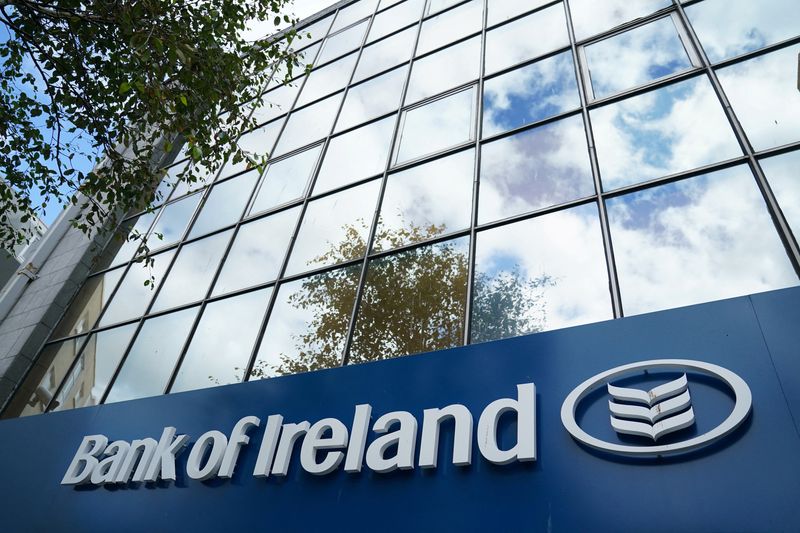
LONDON (Reuters) - European banks are set to hand investors a record 120 billion euros ($130 billion) in dividends and share buybacks this year, analysts say, returning more of the profits reaped from a period of higher interest rates.
Bank of Ireland on Monday became the latest lender to announce a hike in payouts, joining others including BNP Paribas (OTC:BNPQY), Deutsche Bank and Santander (BME:SAN) in promising more cash for their investors.
Switzerland's UBS this month pledged to restart its buyback programme, while state-owned Italian lender Monte dei Paschi di Siena announced it would pay its first dividend in 13 years.
UniCredit said it was giving away all of its 2023 profits - 8.6 billion euros including 5.6 billion euros worth of buybacks - and that it would share 90% of 2024's net profit.
Across European banks, dividend payouts for 2024 will total nearly 80 billion euros, with buybacks taking overall capital returns to shareholders close to 120 billion euros, a record high, Bank of America analysts estimate.
Over the next 15 months, which takes in the final dividend payments yet to be made for 2023 results, as well as the forecast 2024 dividend and planned buybacks, banks are expected to have paid out a total of 172 billion euros - about 17% of their market capitalisation, BofA said.
Banks, after years of depressed share prices as interest rates hovered near zero, have reaped huge profits from the gap between the rates they charge borrowers and how much they pay for deposits.
This has lifted their share prices, and executives have turned to dividends and buybacks as the favoured way to deploy their excess capital.
UBS analysts estimate the top 50 European banks will have a dividend yield of 7.3% in 2024, up from 5.8% in 2022. The yield is expected to drop to 7.2% in 2025 and then hit 7.4% in 2026, UBS analysts calculate.
Still, many lenders' share prices trade significantly below their book value and concerns about falling interest rates and a weaker economic outlook is worrying some investors.
Analysts expect overall bank capital returns to drop back from record highs from next year as buybacks become less generous, with BofA estimating distributions for 2025 of between 110 and 120 billion euros.
($1 = 0.9223 euros)

